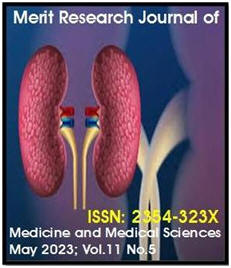
|
|
|
|
|
|
/ / MRJMMS Home / / About MRJMMS / / Submit Manuscripts / / Call For Articles / / Editorial Board / / Archive / / Author's Guide / /
|
Other viewing option
• Full text •Reprint (PDF) (374 KB)
Faisal
EA
|
Original Research Article Barriers to Research and Publications among Family Medicine Residents in Saudi Arabia |
|||
|
Faisal Eid Almutairi1, Khalid Fares Alotaibi1, Mohammed Ali Altokhais1, Abdullah Khalid Alburayk1, Shaden Dhafallah Alshammari1, Ayman Afifi2, Mostafa Kofi2* |
||||
|
1Family Medicine,
Resident; Family and Community Medicine Department, Prince
Sultan Military Medical City, Riyadh |
||||
|
Abstract |
||||
|
Research
activities carried by postgraduate medical residents are very
important in promoting better clinical care, critical reasoning
and writing, keeping updated with local, regional and
international guidelines as well as lifelong education. However,
some barriers were identified to prevent residents from
conducting of high-quality research during residency. The
research objective was to determine the barriers that can
prevent family medicine residents to conduct high-quality
research during residency and to make publication by the
residents during residency. A cross-sectional survey was
conducted among family medicine residents enrolled in the
residency program the of seven largest hospitals in Riyadh City,
Kingdom of Saudi Arabia. A self-reported survey instrument was
used for data collection. It included questions regarding
personal and academic-related characteristics of physicians,
history of taking research during residency, confidence and
motivation in seeking publication of research and barriers and
existing resources conducting research. A total of 254 family
medicine residents responded out of targeted 286, giving a
response rate of 88.8%. The majority of them (85%) aged between
26 and 29 years. Males represented 53.9% of them. Regarding
their future choice after completion of the residency program,
33.1% chose practice as family medicine specialists whereas 24%
chose to pursue a graduate degree. Majority of the respondents
(91.3%) reported taking a research course during residency
training and 85% reported presence of a mandatory research
course during residency training. The commonest reported
barriers mentioned by family medicine residents to complete
their research were lack of overall interest in research project
(40.2), lack of interest in completing research (38.6%), limited
knowledge of the processes associated with research (36.2%) and
lack of time available to complete research activities (24.4%).
Regarding the resources currently available to assist the family
medicine residents in the pursuit of research, the most
frequently reported were mentorship from a preceptor or
colleague with extensive research experience (59.1%) and
mentorship from preceptors with extensive family medicine
practice experience (49.6%). Barriers are existing regarding the
conduction of research projects among family medicine resident
physicians. Thus, people in charge should implement measures in
order to create effective solutions to these barriers. |
Merit Research Journals© 2023 || Advertisement | Privacy policy.
